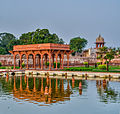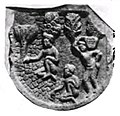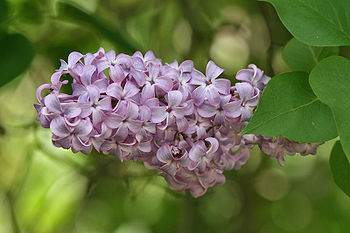The Gardening Portal

Gardening is the process of growing plants for their vegetables, fruits, flowers, herbs, and appearances within a designated space. Gardens fulfill a wide assortment of purposes, notably the production of aesthetically pleasing areas, medicines, cosmetics, dyes, foods, poisons, wildlife habitats, and saleable goods (see market gardening). People often partake in gardening for its therapeutic, health, educational, cultural, philosophical, environmental, and religious benefits. Gardening varies in scale from the 800 hectare Versailles gardens down to container gardens grown inside. Gardens take many forms, some only contain one type of plant while others involve a complex assortment of plants with no particular order. (Full article...)
Horticulture is the art and science of growing fruits, vegetables, flowers, trees, shrubs and ornamental plants. Horticulture is commonly associated with the more professional and technical aspects of plant cultivation on a smaller and more controlled scale than agronomy. There are various divisions of horticulture because plants are grown for a variety of purposes. These divisions include, but are not limited to: propagation, arboriculture, landscaping, floriculture and turf maintenance. For each of these, there are various professions, aspects, tools used and associated challenges -- each requiring highly specialized skills and knowledge on the part of the horticulturist. (Full article...)
General images -
Selected article -

Vermicompost (vermi-compost) is the product of the decomposition process using various species of worms, usually red wigglers, white worms, and other earthworms, to create a mixture of decomposing vegetable or food waste, bedding materials, and vermicast. This process is called vermicomposting, with the rearing of worms for this purpose is called vermiculture.
Vermicast (also called worm castings, worm humus, worm poop, worm manure, or worm faeces) is the end-product of the breakdown of organic matter by earthworms. These excreta have been shown to contain reduced levels of contaminants and a higher saturation of nutrients than the organic materials before vermicomposting. (Full article...)
Selected image
Related portals
Did you know -
- ... that actress Katharine Hepburn threatened to remove her name from a garden in Dag Hammarskjöld Plaza when New York City officials said they would not widen the plaza?
- ... that Chinese Garden MRT station did not originally have access to the Chinese Garden?
- ... that bored soldiers during the siege of Ak-Mechet began stealing watermelons from gardens outside the enemy fortress?
- ... that Parimal Garden in Ahmedabad has scrap-metal monkeys?
- ... that the firm of Israel Sack supplied American antiques to leading private collectors and museums, including the Winterthur Museum, The Henry Ford, and the Metropolitan Museum of Art?
- ... that Elisabeth Whittle, a garden historian, considers the gardens at Powis Castle to be the most important and magnificent in Wales?
- ... that controversy ensued when the painting Pleasure Garden was offered to the Robert McDougall Art Gallery?
- ... that the small flowers that give Aquilegia parviflora its name make it unpopular with gardeners?
Things you can do
- This list is transcluded from the tasks list page. To edit the list, click here
 |
Here are some tasks awaiting attention:
|
WikiProjects
Topics
Categories
Associated Wikimedia
The following Wikimedia Foundation sister projects provide more on this subject:
-
 Commons
Commons
Free media repository -
 Wikibooks
Wikibooks
Free textbooks and manuals -
 Wikidata
Wikidata
Free knowledge base -
 Wikinews
Wikinews
Free-content news -
 Wikiquote
Wikiquote
Collection of quotations -
 Wikisource
Wikisource
Free-content library -
 Wikiversity
Wikiversity
Free learning tools -
 Wiktionary
Wiktionary
Dictionary and thesaurus

































































































